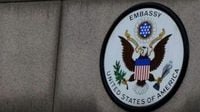Amid escalating tensions in the Middle East, Iranian parliamentarians are preparing a bill that could lead Tehran to exit the nuclear Non-Proliferation Treaty (NPT), a move that would further complicate an already volatile situation. The announcement came on Monday, June 16, 2025, from Iran's foreign ministry, which stressed that while the government must enforce parliamentary bills, the proposal is still in its early stages and will be coordinated with parliament as it develops.
The NPT, ratified by Iran in 1970, is a pivotal international agreement that allows countries to pursue civilian nuclear power while requiring them to forgo the development of nuclear weapons and to cooperate with the United Nations nuclear watchdog, the International Atomic Energy Agency (IAEA). However, the IAEA declared just last week that Tehran was in violation of its NPT obligations, raising alarm bells worldwide. This declaration came amid reports that Iran was on the verge of developing a nuclear bomb, prompting Israel to launch airstrikes on Iranian nuclear and missile facilities the previous Friday, June 13.
These Israeli strikes targeted key military commanders and scientists involved in Iran’s nuclear and ballistic missile programs, marking a significant escalation in the long-standing conflict. In retaliation, Iran launched a barrage of ballistic missiles into Israeli territory, resulting in casualties and property damage, including the deaths of eight Israelis. This tit-for-tat exchange has further destabilized the region and raised fears of a broader conflict.
On the diplomatic front, the United States has taken precautionary measures due to the ongoing hostilities. US Ambassador to Israel Mike Huckabee announced on Monday that the US Embassy in Israel and its consulate will remain closed as a shelter-in-place order is still active. He reported that the embassy branch in Tel Aviv suffered minor damage from the concussions of nearby missile impacts but confirmed that no US personnel were injured. Ambassador Huckabee’s update, shared on the social media platform X, underscored the precarious security situation that continues to unfold.
Despite the mounting tensions and Iran’s potential move to exit the NPT, Iranian officials maintain that their nuclear program remains peaceful. President Masoud Pezeshkian reiterated on Monday that nuclear weapons are forbidden under a religious edict issued by Supreme Leader Ayatollah Ali Khamenei, emphasizing that Tehran does not intend to develop atomic arms. “Nuclear weapons are against the religious edict by Supreme Leader Ayatollah Ali Khamenei,” Pezeshkian stated, reaffirming the regime’s official stance.
Nevertheless, the international community remains deeply concerned. The IAEA’s declaration of Iran’s violation of the NPT obligations is a serious matter given the treaty’s role in preventing nuclear proliferation. Iran’s possible withdrawal from the treaty could dismantle critical safeguards and oversight, potentially enabling the country to pursue nuclear weapons unchecked.
The timing of Iran’s parliamentary bill preparation follows closely on the heels of Israel’s aggressive military actions and Iran’s missile retaliation, suggesting a dangerous spiral of escalation. Israel’s strikes on June 13 reportedly targeted facilities crucial to Iran’s nuclear and missile programs, aiming to halt progress toward weaponization. The killing of Iranian military commanders and scientists in these strikes has been met with fierce condemnation from Tehran and swift retaliation.
The missile attacks launched by Iran caused significant damage within Israel, including the tragic loss of life and destruction of property. The impact was felt not only by Israeli civilians but also by foreign diplomatic missions, as evidenced by the damage to the US Embassy in Tel Aviv. The shelter-in-place order issued by the US Embassy reflects the seriousness of the threat posed by these missile strikes and the ongoing instability in the region.
Iran’s foreign ministry spokesperson Esmaeil Baghaei highlighted the government’s obligation to enforce parliamentary decisions but noted that the bill to exit the NPT is still being prepared and that coordination with parliament will continue. This cautious approach suggests that while Tehran is signaling a potential departure from the treaty, it is not yet a fait accompli, leaving room for diplomatic maneuvering.
The NPT has long been a cornerstone of global non-proliferation efforts, with Iran’s ratification in 1970 marking its commitment to peaceful nuclear development. The treaty’s framework balances the right to civilian nuclear technology with the imperative to prevent the spread of nuclear weapons. Iran’s potential exit threatens to undermine this balance and could encourage other nations to reconsider their commitments, destabilizing the international non-proliferation regime.
The broader geopolitical implications of this development are profound. The Middle East has been a hotspot for nuclear tensions, with Iran’s nuclear ambitions viewed warily by many regional and global powers. Israel’s proactive military strikes reflect its determination to prevent Iran from acquiring nuclear weapons, which it perceives as an existential threat. Iran’s missile retaliation and parliamentary moves indicate a hardened stance that could lead to further conflict.
Meanwhile, the United States continues to monitor the situation closely, balancing its support for Israel with concerns about regional stability. The closure of the US Embassy in Israel and the shelter-in-place directive illustrate the tangible risks that diplomatic personnel face amid escalating violence. Ambassador Huckabee’s communication serves as a reminder of the fragile security environment and the potential for rapid developments.
As the situation stands, the world watches with bated breath. Iran’s possible withdrawal from the NPT would mark a significant shift in the nuclear non-proliferation landscape and could trigger a cascade of reactions from global powers. The recent military exchanges between Israel and Iran underscore the urgency of diplomatic efforts to de-escalate tensions and prevent a wider conflict.
For now, Iran insists on the peaceful nature of its nuclear program, anchored by religious prohibitions against nuclear weapons. Yet, the international community remains skeptical, especially in light of the IAEA’s findings and Israel’s military actions. The coming days and weeks will be critical in determining whether diplomacy can prevail or whether the region will face further instability and conflict.




